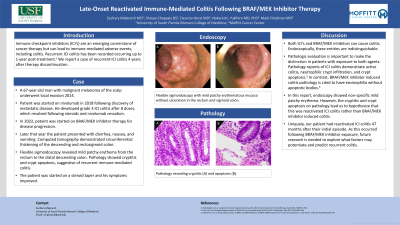Sunday Poster Session
Category: Colon
P0229 - Late-Onset Reactivated Immune-Mediated Colitis Following BRAF/MEK Inhibitor Therapy
Sunday, October 22, 2023
3:30 PM - 7:00 PM PT
Location: Exhibit Hall

Has Audio

Zachary Makovich, MD
University of South Florida
Tampa, FL
Presenting Author(s)
Zachary Makovich, MD1, Shreya Chapyala, 1, Deanna Horst, MD2, Mark Friedman, MD2
1University of South Florida, Tampa, FL; 2Moffitt Cancer Center, Tampa, FL
Introduction: Immune checkpoint inhibitors (ICI’s) are an emerging cornerstone of cancer therapy but can lead to immune-mediated adverse events, including colitis. Recurrent ICI colitis has been recorded occurring up to 1-year post-treatment.1 We report a rare case of recurrent nivolumab induced colitis 4 years after therapy discontinuation.
Case Description/Methods: A 67-year-old man with malignant melanoma of the scalp developed grade 3 ICI colitis in 2018 after being treated with 8 doses of nivolumab for metastatic disease. His colitis resolved with steroids and nivolumab cessation. In 2022, the patient was started on BRAF/MEK inhibitor therapy for disease progression. Then, later that year the patient presented with diarrhea, nausea, and vomiting. Computed tomography demonstrated circumferential thickening of the descending and rectosigmoid colon. A flexible sigmoidoscopy revealed mild patchy erythema from the rectum to the distal descending colon. Pathology showed cryptitis and crypt apoptosis, indicative of recurrent immune-mediated colitis. The patient was started on a steroid taper and his symptoms improved.
Discussion: Both ICI’s and BRAF/MEK inhibitors can cause colitis. Endoscopically, these entities are indistinguishable. Pathologic evaluation is important to make the distinction in patients with exposure to both agents. Pathology reports of ICI colitis demonstrate active colitis, neutrophilic crypt infiltration, and crypt apoptosis.2 In contrast, pathology of BRAF/MEK inhibitor induced colitis shows eosinophilia without apoptotic bodies, as well as a CD4/CD8 ratio greater than 1.3 In this case report, endoscopy showed non-specific mild patchy erythema. However, the cryptitis and crypt apoptosis on pathology support that this was recurrent ICI colitis rather than BRAF/MEK inhibitor induced colitis. Uniquely, our patient had reactivated ICI colitis 47 months after their initial episode. As this occurred following BRAF/MEK inhibitor exposure, future research is needed to explore what factors may potentiate and predict recurrent colitis.
1. Horisberger K, et al. Long-term immune-related adverse events after discontinuation of immunotherapy. April 2021;13(9)735-740
2. Chen JH, et al. Histopathologic Features of Colitis Due to Immunotherapy With Anti-PD-1 Antibodies. May 2017;41(5):643-654
3. Gelsomino F, et al. Drug-induced colitis on BRAF and MEK inhibitors for BRAF V600E-mutated non-small cell lung cancer: a case report. February 2022;40(1):190-193

Disclosures:
Zachary Makovich, MD1, Shreya Chapyala, 1, Deanna Horst, MD2, Mark Friedman, MD2. P0229 - Late-Onset Reactivated Immune-Mediated Colitis Following BRAF/MEK Inhibitor Therapy, ACG 2023 Annual Scientific Meeting Abstracts. Vancouver, BC, Canada: American College of Gastroenterology.
1University of South Florida, Tampa, FL; 2Moffitt Cancer Center, Tampa, FL
Introduction: Immune checkpoint inhibitors (ICI’s) are an emerging cornerstone of cancer therapy but can lead to immune-mediated adverse events, including colitis. Recurrent ICI colitis has been recorded occurring up to 1-year post-treatment.1 We report a rare case of recurrent nivolumab induced colitis 4 years after therapy discontinuation.
Case Description/Methods: A 67-year-old man with malignant melanoma of the scalp developed grade 3 ICI colitis in 2018 after being treated with 8 doses of nivolumab for metastatic disease. His colitis resolved with steroids and nivolumab cessation. In 2022, the patient was started on BRAF/MEK inhibitor therapy for disease progression. Then, later that year the patient presented with diarrhea, nausea, and vomiting. Computed tomography demonstrated circumferential thickening of the descending and rectosigmoid colon. A flexible sigmoidoscopy revealed mild patchy erythema from the rectum to the distal descending colon. Pathology showed cryptitis and crypt apoptosis, indicative of recurrent immune-mediated colitis. The patient was started on a steroid taper and his symptoms improved.
Discussion: Both ICI’s and BRAF/MEK inhibitors can cause colitis. Endoscopically, these entities are indistinguishable. Pathologic evaluation is important to make the distinction in patients with exposure to both agents. Pathology reports of ICI colitis demonstrate active colitis, neutrophilic crypt infiltration, and crypt apoptosis.2 In contrast, pathology of BRAF/MEK inhibitor induced colitis shows eosinophilia without apoptotic bodies, as well as a CD4/CD8 ratio greater than 1.3 In this case report, endoscopy showed non-specific mild patchy erythema. However, the cryptitis and crypt apoptosis on pathology support that this was recurrent ICI colitis rather than BRAF/MEK inhibitor induced colitis. Uniquely, our patient had reactivated ICI colitis 47 months after their initial episode. As this occurred following BRAF/MEK inhibitor exposure, future research is needed to explore what factors may potentiate and predict recurrent colitis.
1. Horisberger K, et al. Long-term immune-related adverse events after discontinuation of immunotherapy. April 2021;13(9)735-740
2. Chen JH, et al. Histopathologic Features of Colitis Due to Immunotherapy With Anti-PD-1 Antibodies. May 2017;41(5):643-654
3. Gelsomino F, et al. Drug-induced colitis on BRAF and MEK inhibitors for BRAF V600E-mutated non-small cell lung cancer: a case report. February 2022;40(1):190-193

Figure: Endoscopic findings during the patient's recurrent episode of colitis revealed mild patchy erythematous mucosa in the rectum (A), in the sigmoid colon (B), and in the distal descending colon.
Disclosures:
Zachary Makovich indicated no relevant financial relationships.
Shreya Chapyala indicated no relevant financial relationships.
Deanna Horst indicated no relevant financial relationships.
Mark Friedman indicated no relevant financial relationships.
Zachary Makovich, MD1, Shreya Chapyala, 1, Deanna Horst, MD2, Mark Friedman, MD2. P0229 - Late-Onset Reactivated Immune-Mediated Colitis Following BRAF/MEK Inhibitor Therapy, ACG 2023 Annual Scientific Meeting Abstracts. Vancouver, BC, Canada: American College of Gastroenterology.

